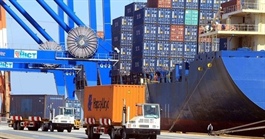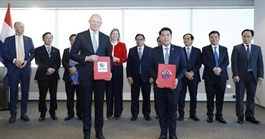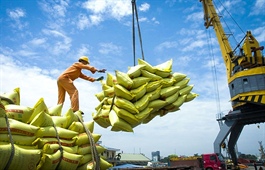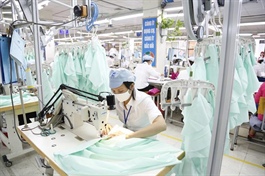Dutch economic relations rising ahead of PM’s visit
Dutch economic relations rising ahead of PM’s visit
Prime Minister Pham Minh Chinh will pay an official visit to the Netherlands on December 13. Dutch Ambassador to Vietnam Kees van Baar spoke to VIR’s Thanh Tung about the trade and investment prospects between both nations.
What are you expecting from this visit and how important will it be for the two countries’ ties, especially in trade and investment?
The visit of PM Chinh highlights the excellent bilateral relations between the Netherlands and Vietnam, in which we look forward to celebrating 50 years of such ties in 2023.
Last week the Dutch Minister for Foreign Trade, Investment and Development Cooperation Liesje Schreinemacher visited Vietnam along with 44 companies. The event resulted in agreements representing a total value of €65 million ($68.4 million). During the visit of PM Chinh, we will likewise look for opportunities to intensify our economic cooperation, especially in the field of agriculture, water, and logistics.
The Netherlands is now the biggest European investor in Vietnam, with over 400 valid projects registered at $13.7 billion. Do you think that these numbers can be improved upon?
Absolutely, there is potential for further growth. To unlock the full potential of our economic relationship, it is important to connect more companies from both countries, like we are doing in these missions. In addition, our economic relations can benefit from further improvement of the investment climate in Vietnam.
Companies from the Netherlands sometimes struggle with bureaucracy and red tape. Last week, during the minister’s visit, the Dutch Business Association in Vietnam presented a so-called Orange Book to Minister of Industry and Trade Nguyen Hong Dien with suggestions from Dutch companies in Vietnam on how the business climate could be further improved.
I am convinced that with the right regulatory framework, our economic relations will continue to grow in the years to come.
The implementation of the EU-Vietnam Free Trade Agreement in August 2020 has brought about numerous opportunities for businesses from both nations to expand cooperation. How effective has the deal been to Dutch-Vietnam trade ties?
Trade between the EU and Vietnam increased significantly in that time. Particularly, exports of Vietnam to Europe have grown substantially. And with 60 per cent of Vietnamese exports destined for European markets entering the EU via the Rotterdam port, the Netherlands plays an important role in supporting and facilitating the further growth of the EU-Vietnam trade.
As the main logistics hub and gate to Europe, we are also interested in supporting development of the logistics sector here. For Vietnam’s growing exports to be shipped all over the world, it is important to develop green and smart infrastructure.
Both nations have cemented partnerships in seaport development. Could you elaborate on this, and how can Vietnam develop its seaports effectively?
The Netherlands has outstanding expertise and experience in port development and logistics, with some companies already boasting a track record in Vietnam stretching back decades. With increasing trade between Vietnam and Europe, there is an increasing risk of port congestion, but developing new ports is costly and time-consuming. In order to make more effective use of the already existing ports, we see opportunities for instance to further develop inland waterway transportation, digitalisation and improve port operations.
Of course, Dutch companies and experts are looking forward to assisting Vietnam in further port development. This also applies to airport development, of course.
The Netherlands has committed to support Vietnam in carrying out the Mekong Delta Master Plan for 2030, with a vision to 2050. How has this commitment been put into practice, and what experiences can the Netherlands share with Vietnam?
We are proud that the plan has been designed with help of Dutch experts and are committed to assist Vietnam with further implementation. Already there are several concrete projects with the involvement of our companies and experts.
The current project portfolio in the Mekong Delta amounts already more than €50 million ($52.6 million) with a focus on climate change, water, and agriculture. Also, the Netherlands is gaining a bigger footprint in renewable energy – for instance, in offshore wind and waste-to-energy solutions.
There are a number of challenges. For instance, in the distribution of renewable energy in cases of overproduction, Vietnam still lacks a regulatory framework and the possibility for companies to share resources. We can not only set the right example in tech, but also share best practices for the benefit of not only our economies, but also for the climate as a whole.
























